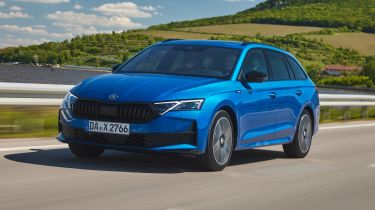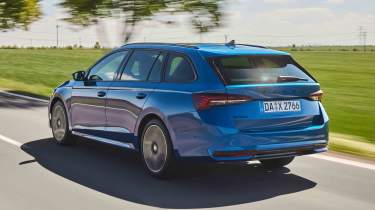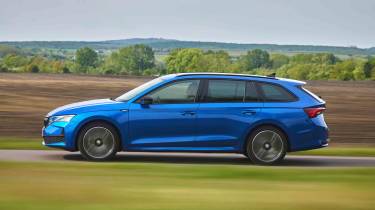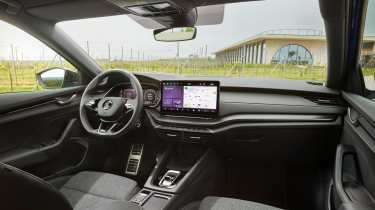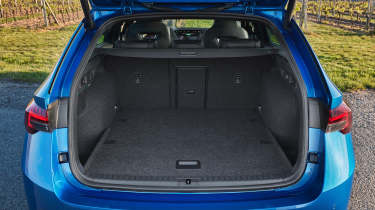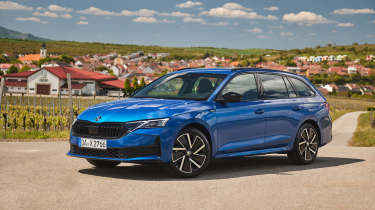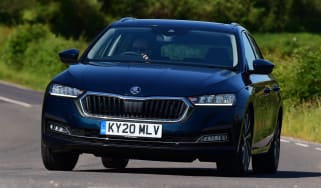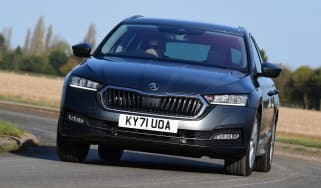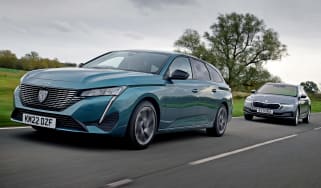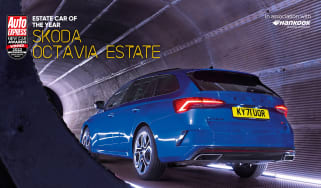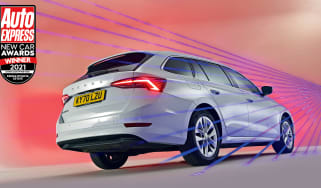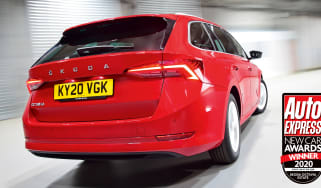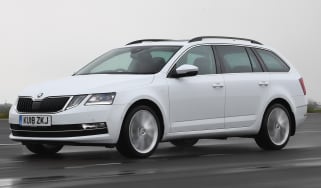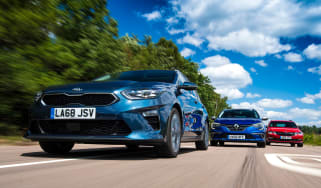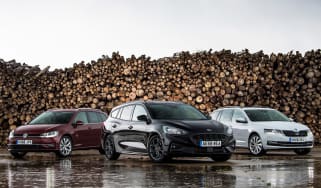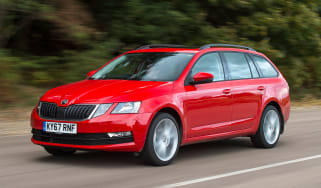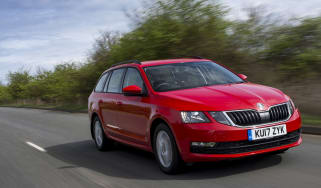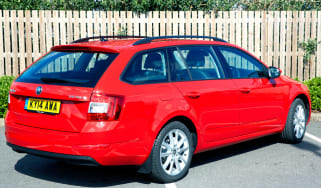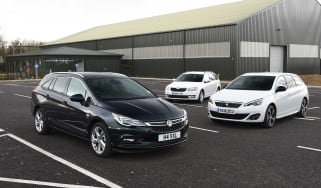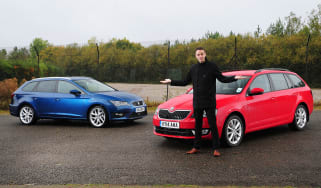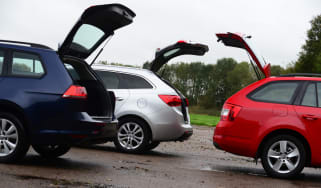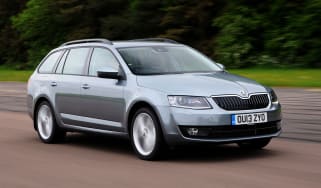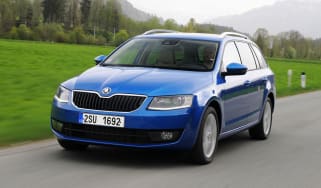Skoda Octavia Estate review
The Skoda Octavia Estate is one of the best family cars around and an excellent alternative to an SUV

Is the Skoda Octavia Estate a good car?
The Skoda Octavia Estate is a shining example of why families shouldn’t be so quick to order a new SUV. It takes everything that’s great about the Skoda Octavia hatchback and adds an even larger boot and an extra dollop of practicality to create one of the best-value family cars on sale today. This is especially true following the 2024 update, which includes a subtle facelift, a new fuel-efficient engine and more kit as standard. It’s even more upmarket than before, although the price reflects this.
|
Key specs | |
|
Fuel type |
Petrol, diesel |
|
Body style |
5-door estate car |
|
Powertrain |
1.5-litre 4cyl turbocharged petrol, front-wheel drive |
|
Safety |
5-star Euro NCAP (2022) |
|
Warranty |
3yrs/60,000 miles |
How much does the Skoda Octavia Estate cost?
The Skoda Octavia has always offered a superb blend of space, practicality and value for money, especially if you choose the estate version. Across continental Europe, it’s actually a bigger seller than the hatchback, so there’s a lot resting on the latest facelifted version.
The changes mirror those rolled out for the hatchback version, with a subtle facelift and some additions to the standard equipment list. On the outside, the restyling extended to new daytime running lights, a revised front bumper, fresh tail lights with an animated ‘welcome’ functionality, and some new alloy wheels and colour options.
Prices start from around £27,500, which makes the Octavia Estate around £1,000 more than the equivalent hatchback version. That price is based on the 114bhp 1.5-litre petrol engine with a manual gearbox in SE Technology trim. Choosing the dual-clutch transmission adds £2,000 to the price, while diesel prices start from around £30,000.
More reviews
Car group tests
- Volkswagen Golf vs Skoda Octavia: a battle for family hatchback supremacy
- Volkswagen Golf vs Skoda Octavia: 2023 twin test review
In-depth reviews
Road tests
- New Skoda Octavia vRS 2024 review: a fantastic and fast family car
- New Skoda Octavia 2024 facelift review: entry-level hatch is great value
- Skoda Octavia vRS (Mk1, 2000-2006) icon review
Used car tests
SE L trim prices start from £32,250, while SportLine prices kick off around £33,000. The flagship Skoda Octavia vRS with a 261bhp 2.0-litre petrol engine costs £39,000, and we’ve covered that version in a separate review.
Engines, performance & drive
The most notable change can be found under the bonnet, where a new version of the 1.5-litre petrol engine has replaced the old 1.0-litre petrol motor. It produces 114bhp and 220Nm of torque, and is available - depending on the trim level - as a cheaper alternative to the 148bhp version. Both have a six-speed manual gearbox as standard, but a seven-speed dual-clutch automatic is also available – and that boasts 48-volt mild-hybrid assistance to boost fuel economy.
Perhaps more significantly for the load-lugging estate car market, Skoda continues to offer the Octavia Estate with a 2.0-litre motor in two states of tune, 114bhp and 148bhp. A six-speed manual is the standard gearbox on the lower-powered version, while the more potent configuration gets the seven-speed automatic, but does without the petrol model’s hybrid tech.
On the road, the 2.0 TDI does a terrific job of reminding you how effective a diesel powertrain can still be – deserving of far more sales, in fact, than it’s likely to get, given market trends. There’s more than 120Nm of additional torque here compared with the 1.5-litre 148bhp petrol, and even with the load bay relatively empty, you can certainly feel it. There’s more than enough shove from less than 1,500rpm, and in general, you’re done and dusted and up to the next gear before 2,700rpm, with the minimum of fuss.
|
Model |
Power |
0-62mph |
Top speed |
|
Octavia Estate 1.5 TSI |
114bhp |
10.5 seconds |
126mph |
|
Octavia Estate 1.5 TSI |
148bhp |
8.5 seconds |
142mph |
|
Octavia Estate 2.0 TDI |
148bhp |
8.5 seconds |
141mph |
This, in turn, means that the gearbox is hopping around all over the place, but most of the time, it manages to perform the necessary manoeuvres smoothly and slickly. It’s best at a cruise, though if you decide to ramp up the pace and use the (cheap-feeling) shift paddles at the rear of the steering wheel, it’ll perform snappily. It’s at low speeds, as usual, where DSG can be exposed, with the occasional jerky shift or flare-up of driveline shunt – but these are relatively rare.
Even so, there’s no doubt that this engine makes the most sense if you’re planning to properly fill the Octavia Estate’s boot and/or all of its seats. It’s more than fast enough, and those reserves of low-down torque mean you’ll rarely have to rev the engine beyond its usual slightly raspy but generally inoffensive drone.
The heavier engine perhaps makes the diesel Octavia a teeny bit more nose-heavy, but its steering, handling and composure remain assured, if uninvolving. The best you can hope for, really, is the satisfaction of stroking the car down a fast, flowing road, because it will come unstuck by its own size and mass (as well as the gearbox) if you try to fling it around on twistier routes.
The body control of the SportLine edition is a little more focused than other trims. It gets suspension lowered by 15mm and 18-inch alloys as standard, but it wouldn’t be our top pick from the range, frankly; it’s not uncomfortable but there’s an undeniable murmur from beneath you, as the car picks up more road imperfections than any of its more conventionally set up stablemates would.
There’s a bit more road noise transmitted, too; we’d be inclined to stick with an SE L wagon on 17-inch wheels instead. Unless, that is, you’re desperate to have the slightly sportier look of SportLine, which is achieved through gloss-black trim elements and more aggressive bumpers.
MPG, emissions & running costs
The most efficient petrol engine isn’t the smaller of the two, but the larger 148bhp. This is thanks to the combination of a dual-clutch transmission and mild-hybrid technology (badged e-Tec), which help to deliver as much as 57.5mpg on a combined cycle, depending on trim level and the size of the alloy wheels. The 48-volt starter generator helps save fuel by stopping the engine in traffic or when coasting, as well as delivering a small power boost to the engine when accelerating to reduce the amount of work it has to do, thus helping to save fuel.
If you spend a lot of time driving in towns and cities, the 1.5-litre engine with mild-hybrid assistance makes a lot of sense, with figures between 52.mpg and 57.5mpg for the 148bhp motor, and 54.5mpg to 55.9mpg for the 114bhp version.
Predictably, the 2.0-litre diesel engine is even more economical, delivering between 57.7mpg and 66.0mpg, depending on the transmission, power output and trim level.
|
Model |
MPG |
CO2 |
Insurance group |
|
Octavia Estate 2.0 TDI 116 SE Technology |
64.7mpg |
115g/km |
17E |
|
Octavia Estate 1.5 TSI 150 SE L |
51.4mpg |
125g/km |
20E |
|
Octavia Estate 2.0 TDI 150 DSG SE L |
61.2mpg |
121g/km |
22E |
With the plug-in hybrid version no longer available – and no plans for Skoda to re-introduce it – company car drivers will most likely opt for one of the diesel engines, which emit between 114g/km and 128g/km of CO2, or head straight to rivals such as the Peugeot 308 SW or Vauxhall Astra Sports Tourer that do still offer a plug-in option.
The Skoda Octavia Estate has low insurance ratings, starting in group 14E (out of 50) before rising to 22E for the 2.0 TDI in SE L trim. These ratings exclude the high-performance vRS version. Because no Octavia Estate costs more than £40,000, all models escape the premium surcharge for Vehicle Excise Duty (VED) road tax. However, you may have to be selective regarding the factory options you pick on premium trims in order to keep it under that £40,000 threshold.
According to our expert data, there’s a bit of variance regarding expected resale values over three years or 36,000 miles. The 1.5 TSI 150 SportLine is only predicted to retain 36 per cent of its original value over this period, whereas the least powerful 2.0 TDI SE Technology is anticipated to maintain closer to 50 per cent.
Design, interior & technology
The entry point for the range, SE Technology, gets a whopping 13-inch infotainment screen, front and rear parking sensors, heated front seats and a plethora of high-powered USB-C ports – as well as 16-inch alloy wheels. It’s available in both diesel choices, but only the lower-powered petrol.
The SE L steps up to 17-inch wheels (not an issue for comfort, based on our experience with a pre-facelift car) and brings animated LED tail-lights, heating on the (two-spoke) steering wheel and windscreen, and a powered tailgate with gesture control. This is offered with both diesels again, but only the higher-powered petrol. The sporty-looking SportLine trim is restricted to just the high-powered petrol in manual form, and the 148bhp diesel auto.
Sat-nav, stereo and infotainment
All models have a 13-inch touchscreen mounted at the top of the dashboard next to the instrument cluster. In common with other touchscreens in the Volkswagen Group, there’s no volume knob, but a slider function is located beneath the screen for adjusting the level. There are also no physical controls for the heating and ventilation, with the driver and passenger controls integrated into the bottom of the screen. The same is true of the controls for the heated seats, which are standard across the range.
Indeed, the spec is generous across the range, including sat-nav, a 10.25-inch Virtual Cockpit digital instrument cluster, wireless SmartLink for Apple CarPlay and Android Auto, voice control and wireless phone charging. There are also four USB-C ports (two in the front and two in the back), along with another one in the rearview mirror for charging a dashcam or aftermarket sat-nav.
Boot space, comfort & practicality
|
Dimensions | |
|
Length |
4,698mm |
|
Width |
1,829mm (2,003 including door mirrors) |
|
Height |
1,468mm |
|
Number of seats |
5 |
|
Boot space |
640 litres, increasing to 1,700 litres with rear seats down |
The sheer amount of cabin and boot space have always been key qualities of the Skoda Octavia Estate, and they remain so here – but are joined by plush, well-judged finishes across the entire range. There’s enough room up front for a six-foot adult to get comfortable, plus the driver has plenty of adjustment in the seat and steering wheel to get comfortable.
Much like the regular Octavia, the estate version has more rear leg room than the equivalent Volkswagen Golf, and the estate version has greater head room in the back, thus solving the slight issue taller rear passengers may have with the normal Octavia due to its sloping roof design.
The Estate boot comes in at a whopping 640 litres with the rear seats in place, and you can boost this to 1,700 litres by folding down the second row; either way, you have a capacity that trumps those of the Octavia’s obvious Stellantis competitors, the Vauxhall Astra Sports Tourer and the Peugeot 308 SW.
Safety & reliability
|
Key standard safety features |
Euro NCAP safety ratings |
|
|
The Skoda Octavia didn’t make the top 50 in our 2024 Driver Power customer satisfaction survey, although the closely related Skoda Kodiaq finished 16th overall. Skoda will be disappointed to finish 23rd out of 32 in the manufacturer rankings, with the likes of Dacia, Suzuki and Alfa Romeo finishing higher. The Czech brand did better than a number of other manufacturers, including SEAT, Mercedes, Vauxhall, Audi, Renault, Volkswagen, Ford, Fiat and MG.
Safety experts Euro NCAP tested the hatchback version of the Skoda Octavia in 2022, awarding it a maximum five-star crash safety rating. There were strong category scores across the board, including 89 per cent for adult occupant protection and 84 per cent for child occupant protection.
Although the entry-level SE Technology trim features multiple airbags and a decent level of driver assistance systems, you’ll need to add the optional Assisted Drive Package for the likes of adaptive cruise control and lane-keeping assistance. An Assisted Drive Package Plus pack is available on some models, adding blind spot monitoring and parking assistance.
Skoda Octavia Estate alternatives
The most obvious alternative to the Octavia Estate is the Skoda Octavia hatchback, which has a 600-litre boot. This can be increased to 1,555 litres with the rear seats folded down, making it a rival to some estate cars, not just family hatchbacks. Other alternatives include the nimble Ford Focus Estate, the stylish Peugeot 308 SW, the well-priced SEAT Leon Estate, the highly-efficient Toyota Corolla Touring Sports or, if you need something larger, the Skoda Superb Estate and Volkswagen Passat - the latter now only comes in estate form.
Frequently Asked Questions
The Skoda Octavia Estate is covered by a three-year/60,000-mile warranty, although this can be extended to five years/100,000 miles for an additional cost. Rivals such as Hyundai and Kia offer coverage for five years and seven years, respectively.
